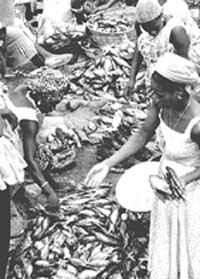Forced destruction
Forced destruction

unemployment , poverty, lack of capital and lax enforcement of laws are to blame for the poisoning of fish in Lake Victoria, environmental experts in Kenya say. The practice, which led to a ban on fish imports from Lake Victoria by the European Union, has jeopardised the country's us $109,375 annual trade in fish. Kinya Munyirwa, a programme officer with the Kisumu-based non-governmental organisation Osienala (Friends of Lake Victoria), says lake communities have resorted to cheap but destructive methods because fishing gear is too expensive. "To get good returns, one needs hooks, nets, a boat and an engine, all valued at around us $3,125. Those who do not use motorised boats need close to us $468, far beyond the reach of many in a country whose Gross Domestic Product ( gdp ) per capita is us $280,' Munyirwa said. In contrast, those who poison fish need only us $3 or less to catch us $234 worth of fish per day. Those using legal methods earn an average of us $62 a day. Says 23-year old school dropout Idi Alamin: "I have spent close to us $156 to buy my nets. Many fisherfolk can't afford that kind of money, so they resort to methods which the government does not want.'
Moses Ikiara, an environmental economist at the School of Environmental Studies at Moi University blames pressure from middlepersons who control the industry and lack of incentives for fisherfolk to use appropriate methods for the rise in fish poisoning. "In any case, they have already lost control over the destiny of their resource to the rich,' says Ikiara, adding that the influx of migrants into the sector has also had a negative impact. According to







